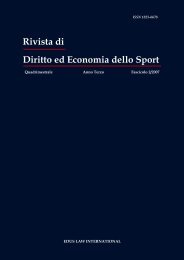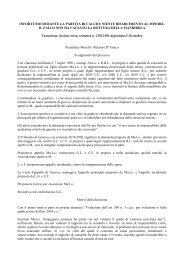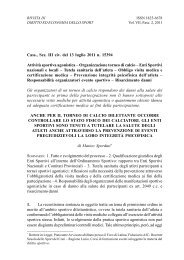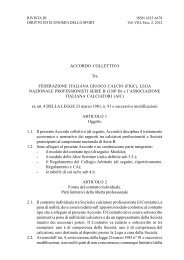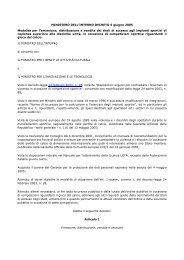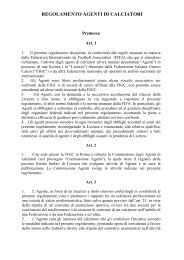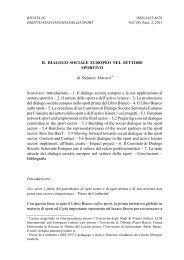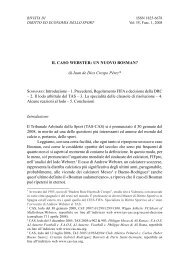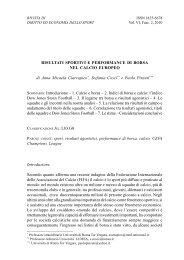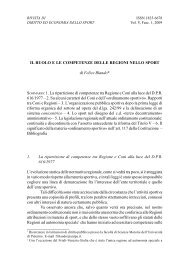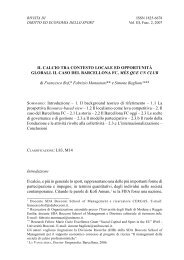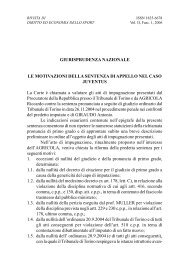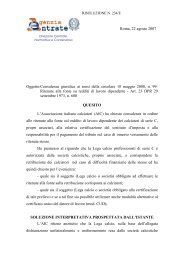Create successful ePaper yourself
Turn your PDF publications into a flip-book with our unique Google optimized e-Paper software.
24 Wladimir Andreff<br />
population) is low in developing countries, between 0.1% and 10% whereas <strong>it</strong> is<br />
over 25% in any developed market economy whatever the measurement methodology<br />
used. Such a gap in less developed countries is mainly due to low physical education<br />
at school (even though <strong>it</strong> is scheduled in class hours and educative programs).<br />
Eventually, the lack of sport teachers and facil<strong>it</strong>ies leads to a shortened and less<br />
intense physical education which sometimes reduces to zero. 23 Given the shortage<br />
of coaches and sports health care, only a few developing African countries are able<br />
to secure a continuous domestic championship in most sports, w<strong>it</strong>h the exception<br />
of football. The Central government and local author<strong>it</strong>ies’ sport financing is qu<strong>it</strong>e<br />
lim<strong>it</strong>ed by very hard budget constraints in countries where more urgent prior<strong>it</strong>ies<br />
(malnutr<strong>it</strong>ion, health, basic education) need more financial attention. Sports facil<strong>it</strong>ies<br />
and infrastructures are so few that most developing countries cannot afford to host<br />
global sporting events. 24 Coupling this are the large income gaps which propel the<br />
best athletes from developing countries to expatriate into wealthy leagues in<br />
developed countries (or oil-endowed countries) and, increasingly, to request their<br />
naturalization – the c<strong>it</strong>izenship of their host country. 25 For example, Qatar is building<br />
up an Olympic team based on naturalized athletes and players, because <strong>it</strong> appears<br />
possible for any person to obtain Qatari c<strong>it</strong>izenship w<strong>it</strong>hin a fortnight. Wilson<br />
Kipketer, a former Kenyan c<strong>it</strong>izen, participated at the Beijing Olympics representing<br />
the Danish team. Economic globalization of sport jeopardizes the very notion and,<br />
possibly, the future of national squads.<br />
Economic underdevelopment of sport in a context of globalization comes<br />
out w<strong>it</strong>h uneven probabil<strong>it</strong>y of winning global (international) sport contests, the<br />
number of wins depending on the level of economic development in athletes’ home<br />
countries. A dozen of econometric tests have already verified such statement of<br />
which the last one 26 confirms that the number of medals won is basically determined<br />
by a nation’s GDP per cap<strong>it</strong>a and population, and by the fact that a country hosted<br />
the Olympic Games. Some add<strong>it</strong>ional variables improve the explanation of medals<br />
won, such as the pol<strong>it</strong>ical regime, regional differences in sport culture (hab<strong>it</strong>s) in a<br />
nation, and athletes’ specialization in some Olympic disciplines, different from one<br />
country to the other.<br />
In the 1990s, UNESCO launched a research program focused on sport in<br />
Africa´s least developed countries which aimed at identifying the main obstacles to<br />
sport development and was envisaging increased co-operation between developed<br />
____________________<br />
23<br />
Y. SOUCHAUD, S<strong>it</strong>uation sportive dans les pays moins avancés d’Afrique: bilan, Division de la<br />
Jeunesse et des Activ<strong>it</strong>és Sportives, Paris, UNESCO, 1995.<br />
24<br />
W. ANDREFF, Sport in developing countries, in W. Andreff, S. Szymanski, (eds.), Handbook on<br />
the Economics of Sports, c<strong>it</strong>., 304-15.<br />
25<br />
W. ANDREFF, (2006d), Pistes de réflexion économique, in D. Oswald, (ed.), La national<strong>it</strong>é dans<br />
le sport. Enjeux et problèmes, Ed<strong>it</strong>ions du Centre International d’Etude du Sport, Univers<strong>it</strong>é de<br />
Neuchâtel, 2006, 171-91.<br />
26<br />
M. ANDREFF, W. ANDREFF, S. POUPAUX, Les déterminants économiques de la performance<br />
olympique: Prévision des médailles gagnées aux Jeux de Pékin, Rev. d’Econ. Pol., vol. 118, n. 2,<br />
<strong>2008</strong>, 135-169.



